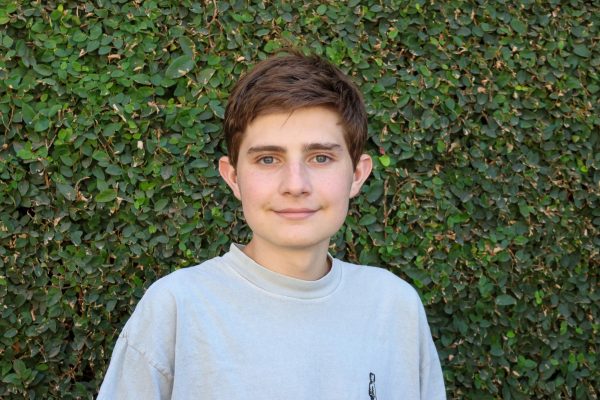When Fred Smith woke to the sound of construction vehicles clearing a plot of land formerly known as Weddington Golf & Tennis just a week before, he knew he had to say something. Smith posted a scathing tirade May 17 on Nextdoor, the popular neighborhood-oriented social media app, denouncing the Los Angeles City Council and the school for the ongoing construction of the new River Park campus. He began his post: “Ahh, nothing like waking up at 6:30 a.m. to the sound of the developer Harvard Westlake’s heavy machinery destroying the heart and soul of Studio City.” He alleged collusion between the school’s supposed dark money financiers and Councilmembers Nithya Raman and Paul Krekorian, writing: “It is obvious they know where their bread is buttered $$$.” He finished his lengthy post on an ominously conspiratorial note: “Follow the money…….”
Nextdoor is one of several micro-social media sites to have emerged in the past decade. Launched in 2011, it aims to connect neighbors by allowing them to share local news and important information, request help from fellow neighbors, advertise jobs and report crimes. This sounds good in theory — a platform that fosters a deeper sense of community through hyperlocal civic engagement and positive neighbor-to-neighbor relationships could be truly valuable, especially when most of us barely even know our next-door neighbors.
As Smith’s River Park grievances reveal, Nextdoor fails to live up to these expectations. Instead of fostering friendly neighbors and local updates, Nextdoor and similar hyperlocal social networks have become cesspools of suburban paranoia and divisive rhetoric and breeding grounds for mistrust.
To understand the paranoid echo chamber that is Nextdoor, you have to understand that the earlier River Park post was not an anomaly. The app’s search results are filled with a litany of dozens upon dozens of similar messages from the last several months, from allegations of city-wide mafia-esque corruption and bribery schemes to (now deleted) accusations of the “slaughter” of local squirrels. The ultimate question is psychological — how can some be so enraged by a sports complex that they feel the need to respond with conspiracy-laden invectives on Nextdoor of all places? There are irrationally angry people on all social media sites, but there’s something specific about micro-social networks like this one that fosters such great outrage over such a niche non-issue as River Park.
The answer is Nextdoor, like all social media sites, creates feedback loops that reinforce people’s pre-existing anxieties about their neighborhoods. It takes people who are already aware of local politics and paranoid about crime, public safety and property values and introduces them to a self-reinforcing rabbit hole. The most active Nextdoor users aren’t just confined to the internet. They project their distrustful, closed-minded opinions into the real world too, influencing neighbors and neighborhood councils alike. For instance, Smith’s post indicated he had attended previous River Park hearings at the Studio City Neighborhood Council. None of this is surprising. Whatever its founders’ real intentions, it was ultimately utilized as a forum for the most hyper-online yet aggressively opinionated homeowners, and it hasn’t strayed far from this path.
As funny as a lot of these examples are, hyperlocal social networks have a much darker, racially charged side. Suburban anxiety about crime is often underscored by racial profiling, and nowhere is this more evident than on sites like Nextdoor. On Nextdoor, search keywords like “Black” or “African-American,” and you’ll quickly find recent posts from LA users like: “6’1“ African-American trying to purchase a scooter with counterfeit bills.” The issue isn’t that this user reported an alleged crime but that they engaged in explicit racial profiling. Even in Los Angeles alone, a vastly disproportionate number of posts alleging suspicious activity single out Black people, sending an overriding message that non-white people are inherent targets of suspicion on Nextdoor. For instance, another user who warned of a suspicious man in a black mask gave a succinct yet telling description in a comment: “He is African American male 20s.” The replies to this post are equally contemptible. One reads: “Normalize judging books by their covers” and another: “Surprise!!” Despite no evidence of the man committing any crime, another reply read: “This guy just looks like such an obvious criminal!”
These are not isolated incidents, and this issue has been occurring for years. News articles reporting racial profiling on Nextdoor go back to at least 2015. Numerous non-white people have reported harassment and false crime alerts stemming from racists on the platform. The company has repeatedly attempted to eliminate racism through stricter moderation and new policies that, for instance, banned explicit profiling in 2016 and eliminated the “forward to police” feature in 2020 during the George Floyd protests. One co-founder told Wired in 2017 the company had cut down on instances of racial profiling by 75% by implementing a new form-based process for Crime and Safety posts, which required users to provide specific, non-exclusively race-based details and think critically before posting to curb impulsive, biased reports. This certainly seems like a good-faith effort, but given the recency and blatancy of these racially targeted posts and comments, there’s still much work to be done.
The fundamental issue with apps like Nextdoor is that they profit from a constant stream of paranoia. Whether or not that is their intent, the toxic environment of fear they promote warps their users’ perspectives of reality, convincing them of ever-lurking neighborhood threats, from random homeless people to vaguely suspicious non-white people walking through the wrong neighborhood. This inevitably feeds off pre-existing prejudices based on racism, from subtle profiling to unabashed bigotry. Crime hysteria and a bizarre fixation on petty municipal politics are inevitable outcomes of a site that allows users to share their unfiltered thoughts about their neighborhoods.
The real problem is more existential. We need to critically reflect on how we, as members of our own neighborhoods, interact with these kinds of micro-social media platforms and whether fostering online communities centered around fear and incessant paranoia will inevitably enable people’s worst impulses. Absent proper moderation, we allow platforms like Nextdoor to turn insular and become infested with misinformation and bigotry. It seems like a fundamental law of the Internet that all sites will inevitably become inundated with debunked 5G tower conspiracies and racist tirades without severe crackdowns from site administrators. We, whether users of Nextdoor or the internet more broadly, need to actively confront online intolerance, and Nextdoor itself must institute harsher moderation and anti-hate speech policies.





























Heather M • Jul 15, 2024 at 2:54 pm
Nextdoor works the way it works. Harvard Westlake took a public space and made it private and they work ceaselessly to blame anyone who is upset about this fact.
H myman • Jul 15, 2024 at 1:50 pm
The river park development is a non-issue? What is an issue? LAPD arrests on campus? Suicides?
Shiela M Carlson • Jun 8, 2024 at 9:55 am
I was on Nextdoor for about two months. Complaining, tirades, racism prevailed in the posts. It was a horrible experience. This site should be taken down before someone gets hurt.